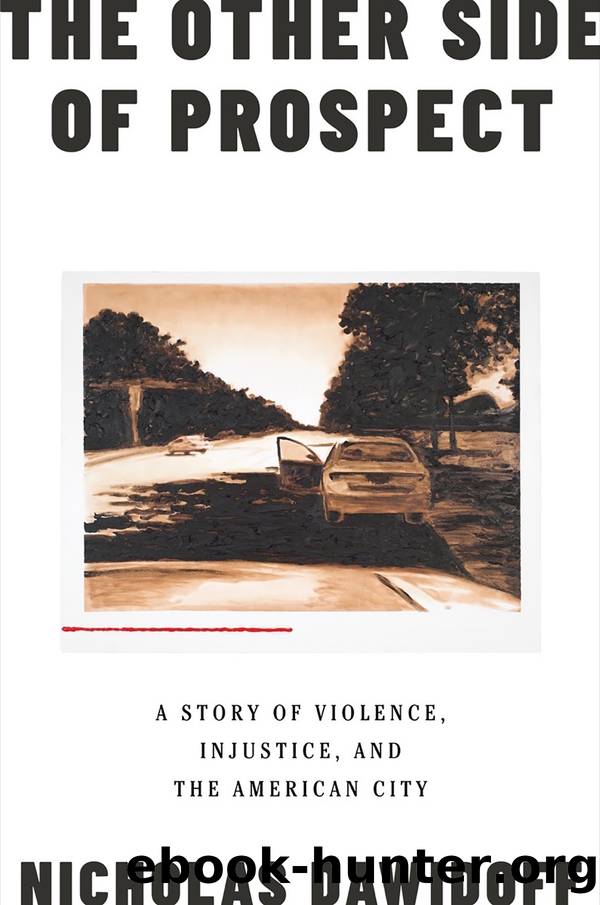The Other Side of Prospect by Nicholas Dawidoff

Author:Nicholas Dawidoff
Language: eng
Format: epub
Tags: Epub3
Publisher: W. W. Norton & Company
Chapter Thirteen
Missing suffused Big Cheshire. There were people from the city who missed the sound of emergency-vehicle sirens and the explosion of holiday fireworks. Country prisoners missed the insect-hum of night. Men missed womenââFemales drive guys crazy in there,â Bobby said. âThese guys take thirsty to another level.â Pornographic magazines were passed from cell to cell, and the âSpanish channelâ was judged the best for masturbation because the newscasters and the women in advertisements wore such revealing clothing. For female COs, their days meant ceaseless calls of âHow you doinâ?â and men in cells reaching down to their pants at the sight of them. While sexual-assault policies were prominently posted, as far as Bobby knew, there was no sex slavery. What people who were never alone seemed to miss most was intimacy. They missed being partners and husbands, and those who took the missing hardest of all, it seemed to Bobby, were the fathers.
The cells were humid with fatherly pining and self-recrimination, especially at Thanksgiving and Christmas. âAway from their kids at holidays,â Bobby said, âitâs the most depressing times men go through in prison.â Men distraught in the failures that had landed them apart from their children, whom they were letting down on these days everybody knew signified family. âThese guys are hurting,â Bobby said. âYou had this guy literally go bald in front of me because he couldnât see his son.â
Almost everybody Bobby knew at prison was Black. Almost every son whose background Bobby knew at prison had no father in his life. Almost every father, so far as Bobby knew, wasnât married. âWe all come from the same broken system of broken homes,â he said. The subject of absent African American fathers has long been controversial, especially since the Moynihan Report blamed a tangle of cultural pathology for the phenomenon of broken Black families rather than lack of life opportunity. Similarly, poverty has long been misjudged as something deserved rather than caused. During Bobbyâs early years in prison, what was growing ever clearer was the parallel relationship between the loss of jobs at factories like Winchester and the massive Black male prison population from postindustrial neighborhoods like Newhallville. Bobby never experienced the beautiful âHow-doâ Newhallville Pete Fields knew as a teenager. What Bobby saw in prison was the longing for its stability.
The desire at Big Cheshire to be a father and son was palpable. Half of Americaâs prisoners have children under eighteen, and at Big Cheshire young Bobby became the object of attempted surrogate parenting from cellies and others he scarcely knew. These included âan older Spanish guy that swore he was my father.â In his early years, Bobby encountered so many of his friendsâ fathers, it hit him one day that prison was where the missing Newhallville fathers were. In the middle of conversations he would realize, âOkay, thatâs your son? I went to school with your son!â Then heâd think, âThatâs how you meet people these days.â Jerome said heâd discover his Newhallville friendsâ fathers
Download
This site does not store any files on its server. We only index and link to content provided by other sites. Please contact the content providers to delete copyright contents if any and email us, we'll remove relevant links or contents immediately.
Nudge - Improving Decisions about Health, Wealth, and Happiness by Thaler Sunstein(7706)
The Fire Next Time by James Baldwin(5444)
iGen by Jean M. Twenge(5415)
Adulting by Kelly Williams Brown(4574)
The Sports Rules Book by Human Kinetics(4386)
The Hacking of the American Mind by Robert H. Lustig(4382)
The Ethical Slut by Janet W. Hardy(4251)
Captivate by Vanessa Van Edwards(3839)
Mummy Knew by Lisa James(3691)
In a Sunburned Country by Bill Bryson(3542)
The Worm at the Core by Sheldon Solomon(3487)
Ants Among Elephants by Sujatha Gidla(3467)
The 48 laws of power by Robert Greene & Joost Elffers(3291)
Suicide: A Study in Sociology by Emile Durkheim(3022)
The Slow Fix: Solve Problems, Work Smarter, and Live Better In a World Addicted to Speed by Carl Honore(3009)
The Tipping Point by Malcolm Gladwell(2921)
Humans of New York by Brandon Stanton(2873)
Get What's Yours for Medicare: Maximize Your Coverage, Minimize Your Costs by Philip Moeller(2729)
Handbook of Forensic Sociology and Psychology by Stephen J. Morewitz & Mark L. Goldstein(2705)
